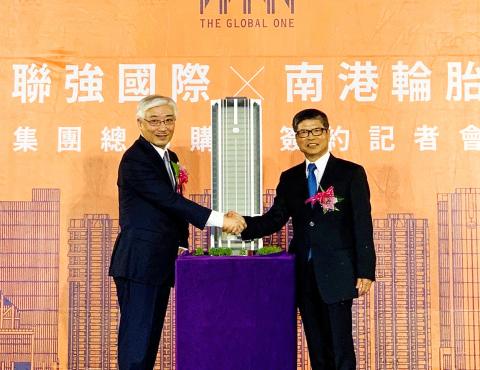Synnex Technology International Corp (聯強國際) yesterday inked a deal to buy office space from Nankang Rubber Tire Corp (南港輪胎), which is turning an old factory site in Taipei’s Nangang District (南港) into an upscale mixed-use complex.
The electronics distributor, its affiliate Winbond Electronics Corp (華邦電) and Y. S. Educational Foundation (育秀教育基金會) have agreed to buy 15 floors for NT$6.36 billion (US$205.15 million), or NT$1 million per ping (3.3m2), in the Global One (世界明珠) complex.
The deal pushed commercial property prices to a new high in a district that might see a massive influx of corporate tenants in the next five years, as office space in the prime Xinyi District (信義) is approaching full occupancy without signs of new supply in sight, market watchers said.

Photo: Yang Ya-min, Taipei Times
Synnex Technology’s deal comes before Nankang Rubber has even officially launched the Global One project, which is expected to see a sales volume of about NT$100 billion, real-estate brokers said.
Synnex Technology president Evans Tu (杜書伍) said the company would put its global operation center in the new offices, after the new complex is completed in 2023, ending five years of searching for a site.
The complex is to be built on a 10,000-plus ping plot, with two office buildings and six residential buildings with floor space totaling 70,000 ping, Nankang Rubber said.
“The complex, close to Nangang High Speed Rail Station, will become a new landmark all occupants could be proud of,” said former Nankang Rubber chairman Lin Hsueh-pu (林學圃), who remains honorary chairman of the company.
The tire maker would move its own headquarters there, he added.
The complex is to include 6.7 percent retail space and 1.7 percent for a performing arts space, said Jay San Lin Group (甲山林機構), which is marketing the project.
Jay San Lin said it plans to set up a sales center toward the end of the year, but not formally introduce the project until after the Jan. 11 presidential and legislative elections to avoid political uncertainty hurting sales.
Selling prices for residential apartments could be NT$1.5 million per ping in light of the location, real-estate brokers said.
Synnex Technology, known in recent years for its astute acquisition and merger program, would not spend money on unworthy assets, brokers said.
Synnex shares yesterday rose 1.23 percent in Taipei trading to close at NT$36.9, while Nankang’s shares gained 1.21 percent to end at NT$41.95.

Greek tourism student Katerina quit within a month of starting work at a five-star hotel in Halkidiki, one of the country’s top destinations, because she said conditions were so dire. Beyond the bad pay, the 22-year-old said that her working and living conditions were “miserable and unacceptable.” Millions holiday in Greece every year, but its vital tourism industry is finding it harder and harder to recruit Greeks to look after them. “I was asked to work in any department of the hotel where there was a need, from service to cleaning,” said Katerina, a tourism and marketing student, who would

i Gasoline and diesel prices at fuel stations are this week to rise NT$0.1 per liter, as tensions in the Middle East pushed crude oil prices higher last week, CPC Corp, Taiwan (台灣中油) and Formosa Petrochemical Corp (台塑石化) said yesterday. International crude oil prices last week rose for the third consecutive week due to an escalating conflict between Israel and Iran, as the market is concerned that the situation in the Middle East might affect crude oil supply, CPC and Formosa said in separate statements. Front-month Brent crude oil futures — the international oil benchmark — rose 3.75 percent to settle at US$77.01

Merida Industry Co (美利達) has seen signs of recovery in the US and European markets this year, as customers are gradually depleting their inventories, the bicycle maker told shareholders yesterday. Given robust growth in new orders at its Taiwanese factory, coupled with its subsidiaries’ improving performance, Merida said it remains confident about the bicycle market’s prospects and expects steady growth in its core business this year. CAUTION ON CHINA However, the company must handle the Chinese market with great caution, as sales of road bikes there have declined significantly, affecting its revenue and profitability, Merida said in a statement, adding that it would

UNCERTAINTIES: The world’s biggest chip packager and tester is closely monitoring the US’ tariff policy before making any capacity adjustments, a company official said ASE Technology Holding Inc (日月光投控), the world’s biggest chip packager and tester, yesterday said it is cautiously evaluating new advanced packaging capacity expansion in the US in response to customers’ requests amid uncertainties about the US’ tariff policy. Compared with its semiconductor peers, ASE has been relatively prudent about building new capacity in the US. However, the company is adjusting its global manufacturing footprint expansion after US President Donald Trump announced “reciprocal” tariffs in April, and new import duties targeting semiconductors and other items that are vital to national security. ASE subsidiary Siliconware Precision Industries Co (SPIL, 矽品精密) is participating in Nvidia